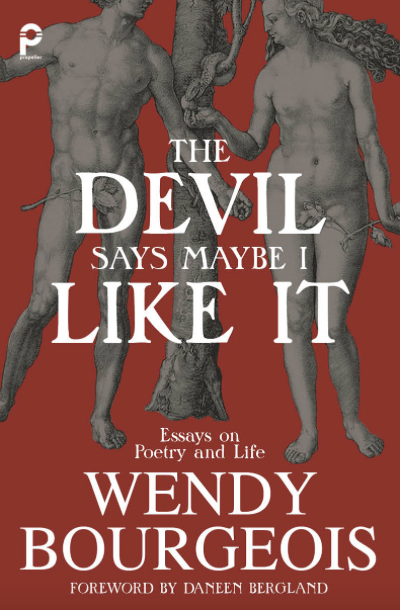The Devil Says Maybe I Like It (Propeller Books, 2018) by Wendy Bourgeois is seventy-four pages of funny, thought-provoking, and fulfilling prose. Each of the seventeen essays in this brief and lovely book offer meaningful and challenging bits of wisdom and humor. An hour and a half into my reading, I found myself inspired to compose my own “Public Apology for Lack of Sexual Integrity,” armed with now knowing the meaning of the word “onanistic.” And certainly the next time I hear a dude talking overly longish, I’ll probably laugh to myself and think “onanistic pyrotechnics.” Bourgeois gives a refreshing and realistic portrayal of grace and humor in action within the brief pages of The Devil Says Maybe I Like It.
This collection of braided essays is a very welcome example of how broad and yet intimate nonfiction can be. There are a total of seventeen essays in the collection, and each begins with a brief line of poetry that acts as a query or launching pad for discussions around a myriad of topics: death and sex, the fodder for creative work, women and expectations of behavior and appearance, aesthetic beauty, marriage and freedom, the nature of prayer and what God looks like, to mention just a few. All of these subjects might easily read heavy and overly pedantic, but Bourgeois draws from her life’s experiences in an arresting style of writing that is both candid and perceptive, self-deprecating and loving.
Several essays also offer up perspectives on the act of choosing to write. The book is truly an homage to those entrenched in such pursuits, as she states in her introduction: “Sometimes, when I steel myself for the hateful task of submitting my poems to literary journals, I think about all the poets I know in real life, and how beautiful they are, and how they don’t know it, how they labor over these odd little flashes of magic no one reads, no one will probably ever read, and how dumb it is to even try, since everyone dislikes it anyway—and I love them so, so much. This book is for them.”
This collection is for anyone who might suffer from thinking too much, who has a love/hate relationship with poetry, blood pressure over 160, or understands that love is revision. The Devil Says Maybe I Like It is like listening to a conversation both funny and smart as hell, because the speaker’s flowing but quickly-shifting discourse requires that one pay attention. In the case of these essays, it is well worth it.
—
Stephanie Sandmeyer is an Editorial Assistant for Portland Review.

